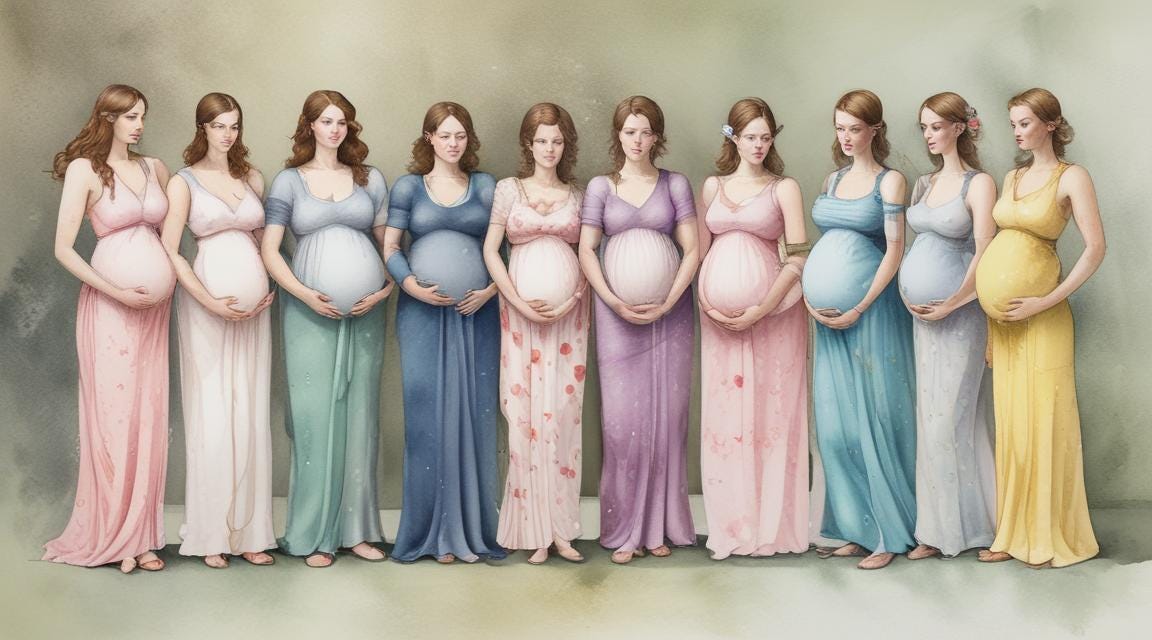The 10 Commandments of Pregnancy After Loss
Reflections from 100+ hours of listening to pregnancy after loss stories—and what I’ve learned (and you can too)
The Guides of Pregnancy After Loss
Pregnancy after loss is an emotional terrain that often feels impossible to navigate. It's a journey marked by the push and pull of hope and fear, joy and sorrow, love and grief. Over the years, through countless hours spent listening to the stories of women who have walked this path, I’ve learned so much—lessons I’m honoured to pass on.
Here are ten reflections—ten guides—that I hope will bring you comfort, reassurance, and maybe, just a little bit of peace. They are not strict rules to follow, but rather gentle reminders, ways to help you navigate this uniquely complex experience.
1. Embrace both fear and joy, grief and hope
It’s often said that pregnancy after loss is an emotional rollercoaster—and I can’t think of a better way to describe it. One moment you may feel joy, and the next, it’s swallowed by fear. Sometimes hope is overshadowed by grief. It’s messy, it’s contradictory, and it’s exactly how it’s meant to be.
A common sentiment I hear from women is how much they wish they could feel the way they did during their first pregnancy—before loss. But the truth is, this pregnancy holds a different context, and that’s okay. You’ve been through so much. This experience is shaped by your past, your loss, and it’s okay for it to feel different.
It’s not about choosing one emotion over the other, but learning to hold them both. Joy and fear. Hope and grief. These emotions aren’t opposites—they can coexist, and bringing them together is part of the healing process.
2. Preparing won’t jinx it
The idea that preparing for this baby—whether it’s buying things, telling people, or even allowing yourself to bond—might ‘jinx’ it is such a common thought for mothers who’ve experienced loss. It feels like letting yourself hope is a risk you just can’t afford to take, because what if it happens again?
But here’s the thing—whether or not you buy that outfit, whether or not you start preparing in some way, it won’t influence the outcome of this pregnancy. The love, the hope you’re allowing yourself to feel now, is not going to change what’s to come, just as touching wood won’t prevent bad things from happening.
Do what feels right for you. There is no jinx, no curse waiting to be triggered. There’s only your journey, and you’re allowed to make space for hope in it, even if it feels scary.
3. It was not your fault
This one breaks my heart every time it comes up, because it’s a feeling that so many carry with them—the guilt that somehow, they were responsible for the loss. Whether it’s the food they ate, the work they did, or the stress they felt, I hear it all the time: What if it was something I did?
But let me say it loud and clear—it was not your fault. I know it’s hard to hear, let alone believe, but no matter the circumstances of your loss, most of the time there’s nothing you could have done to change the outcome. So please, be kind to yourself. Forgive yourself. You did not cause this.
4. Your thoughts are not facts
If there’s one thing that pregnancy after loss brings to the forefront, it’s those anxious, overwhelming thoughts. The ones that jump straight to the worst-case scenario and hold you captive in fear. It’s easy to get swept away, to believe that just because you’re thinking something bad might happen, it will happen.
But your thoughts aren’t facts. They’re stories your brain is telling you, fuelled by fear. The real skill here—one that can save your sanity—is learning to step back from those thoughts, to notice them without believing them. It’s about recognising that just because your mind is whispering, “What if…” doesn’t mean it’s true.
5. Your feelings are not facts
Just like your thoughts, your feelings can sometimes mislead you. Now, this isn’t to say your feelings aren’t valid—they absolutely are. Anxiety, fear, guilt—they all deserve to be acknowledged. But that doesn’t mean they’re reflecting reality.
You might be sitting there, feeling anxious, thinking, What if something is wrong?—even though just a few moments ago, you heard your baby’s heartbeat at the midwife's office. That anxious feeling is real, yes. Does that anxiety mean something is wrong? No. It just means you’re feeling anxious. Your feelings need validation, yes—but they don’t always match the facts.
It’s a tricky balance—honouring your emotions while also recognising when they’re not telling you the whole truth.
6. Worry won’t prepare you—it’ll only exhaust you
So many times, I hear mums say, I worry because it prepares me for the worst. It helps me be ready. But does it really? Does worrying about something before it happens truly make it easier when (or if) it does?
The reality is, worry doesn’t prevent pain—it just makes you live through it twice. And most of the time, the worst-case scenario you’re imagining never even happens. So instead of letting worry drain your energy, try to focus on staying grounded, staying in the present moment, because that’s where you have the most control.
7. Talking about your loss will help heal you
There’s this idea that talking about your loss will reopen the wound, make it harder to heal. And it’s often reinforced by others who think they’re protecting you when they avoid asking about your loss.
But the truth is, silence doesn’t heal. Talking does. Talking about your baby, your miscarriage, your pain—it’s how you integrate the grief into your present. It’s how you honour your journey and allow yourself to move forward with both your loss and your love for this new baby.
8. Choose hope over fear
This pregnancy is different from the others, and nothing can change that. But what you can change is how you choose to move through it. Every day, you have the choice to lean into hope rather than fear, even if it’s just in small ways.
Maybe it’s not going out and buying baby clothes just yet, but maybe it’s treating yourself to something that makes you smile, or letting yourself dream a little about the future. These little choices towards hope are what keep you going, even when fear is tugging at you.
9. One day at a time
It’s such a cliché, but it’s also true—pregnancy after loss can only be survived one day at a time. When the future feels overwhelming, and the “what ifs” start swirling, the best thing you can do is bring yourself back to the present. Take things moment by moment, hour by hour, because that's how you’ll get through this.
10. You are not alone—lean on others
Pregnancy after loss can feel like the loneliest journey in the world. But even when it feels like no one truly understands, you are not alone. There are others who have walked this road, and they will get it. There are communities and professionals ready to support you—don’t be afraid to lean on them. Discomfort shared is discomfort halved.
Final thoughts
These guides are not rules to follow. They’re simply reflections, ways to help you navigate this complicated, messy experience. And if nothing else, I want you to remember this—you’re already doing your best, and that’s enough.
Now, I’d love to hear from you.
Which of these guides resonated with you the most?
Is there anything you’d add from your own experience?
Let’s start a conversation—because talking really does help.









Love this so much. Thanks for being brave enough to post this. ❤️